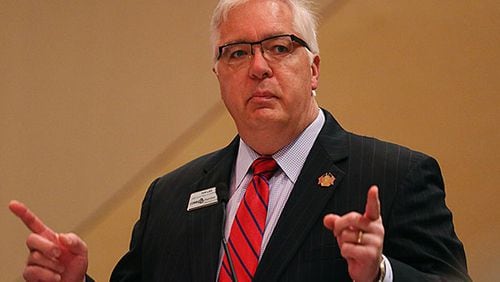Cobb County $40 million park bond votes:
2008: Passed, 101,718 (67%) to 49,694 (33%)
2006: Passed, 120,875 (72%) to 47,883 (28%)
Land purchases with revenue from 2006 park bonds:
- Stockton/Bullard property: $18.6 million, 112.4 acres
- Stana Property: $5.2 million, 137.4 acres
- Hyde Farm: $5 million, 47.5 acres
- Mabry Property: $4.2 million, 26.4 acres
- Henderson Property: $2.4 million, 15.4 acres
- Leone Hall Price Property: $1.4 million, 17.7 acres
- Dovin Property: $1.3 million, 12.9 acres
- Hamby/Watts Property: $827,000, 7.5 acres
For more coverage of the Braves move to Cobb County, visit our page on MyAJC.com.
Cobb County will cover about half the county’s promised financing of the new Braves stadium by diverting millions of dollars in property taxes that voters approved in 2008 to buy park land.
While not illegal, the decision made by commissioners last year is galling to parks supporters who say the county has a ‘moral obligation’ to spend the tax money as promised.
And although Cobb County Chairman Tim Lee has repeatedly assured property owners that they will not see a tax increase for the stadium, the county could otherwise lower the millage rate. That would mean a savings of about $20 a year for the average Cobb homeowner.
Last year, the AJC detailed the stadium financing plan, which also includes the county borrowing about $386 million that’s been committed to stadium construction.
The county commission, led by Chairman Tim Lee, announced last year their intent to keep the 0.33 mills on the books for an additional 30 years, and dedicate the revenue to cover about half of the county’s financing of SunTrust Park. The tax generates $8.6 million annually, and will account for $258 million during the life of Cobb’s financing agreement with the Braves.
The decision, made without the consent of voters, is particularly upsetting to green space advocates.
That’s because after the successful 2006 referendum, which resulted in the purchase of 387 acres, voters went back to the polls and approved a second parks bond referendum in 2008. Although the measure passed with 67 percent of voters’ approval, the county commission never issued those bonds and no additional green space was ever purchased.
Jim Dugan served on the Cobb Parks Coalition, which worked to get parks referendum on ballots, and then served on the committee that evaluated undeveloped land for possible purchase. Dugan said the county has a moral obligation to either take the tax rate off the books or dedicate the revenue for more parks, in fulfillment of the 2008 vote.
“I’ve always believed that,” said Dugan, who said he was forced to resign as a board member of the county’s Department of Parks, Recreation and Cultural Affairs after being critical of Lee’s plan for dedicating the property tax to the stadium. “A lot of people in the Cobb Parks Coalition felt the same way, and still feel that way. The voters approved it.”
Lee has said repeatedly that Cobb property owners will not incur a tax increase for the Braves stadium, because they’re already paying the millage rate for the 2006 park bond referendum. A fact sheet on the county’s web page calls the $8.6 million — by far the largest stream of revenue in the stadium financing package — a “reallocation of existing revenues.”
“Plans call for no property tax millage increase for homeowners,” it says. The fact sheet does not mention the parks bonds, or that there could be a millage rate reduction if not for the stadium.
Former commission chairman Sam Olens made the initial decision to not move forward with bonds after the 2008 vote. Eyeing a run for attorney general at the time, Olens said he was unwilling to issue the debt because it would result in a property tax increase.
Olens, who is now attorney general, did not respond to an interview request left with his public relations department by The Atlanta Journal-Constitution.
Lee, who has announced his intention to seek re-election in 2016, also refused to be interviewed for this story. But he made it clear at a February town hall meeting that no new parks bonds would be issued anytime soon, saying doing so would still require a property tax increase.
“Chairman Olens … made a promise that the only way he would move forward [with the 2008 parks bonds] is if it could be absorbed within the existing [tax rate] at that time,” Lee said in response to a question by Roger Buerki, who also served on the committee that evaluated land for the county to buy after the 2006 vote.
“Shortly after it passed, [property values] sank as a result of what was going on with the economy and we were unable to issue additional bonds without taxes going up,” Lee said. “We are still not at that point.”
Buerki called that answer “specious,” and said the commission should use the revenue from the expiring parks bond to buy more green space as voters demanded in the 2008 vote. He said if the Braves stadium is a good deal for taxpayers, Lee and the commission should be willing to stand behind it with a new property tax.
He called the current arrangement a “sleight of hand.”
“My word for what they’re doing is unseemly — that seems to fit,” Buerki said. “The commissioners might want to see an audiologist. They hear the Braves just fine, but they don’t hear the voters.”
Commissioner Bob Ott, who represents the Cumberland area where the $622 million Braves stadium is under construction, maintains that the park bonds and the Braves stadium are unrelated. But Ott did say that he thinks the net effect of the Braves stadium is a county-wide property tax increase, because otherwise the millage rate related to the parks bonds would come off the tax roll.
“When the chairman came forward with the Braves deal, the last thing I was thinking of is: oh, there’s a park bond out there” that we need to fulfill, said Ott, who was not in office for either the 2006 or 2008 referendums.
Lee was a district commissioner when both of those votes took place.
About the Author







